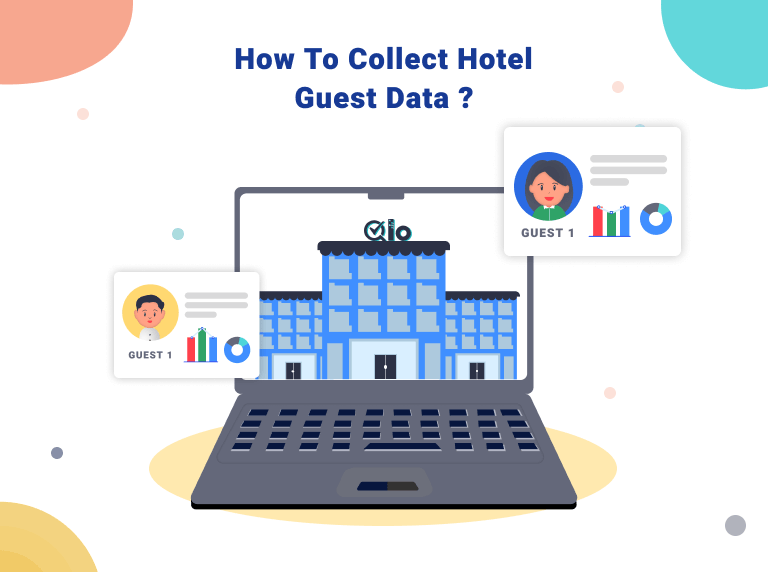In today’s digital age, data has become the lifeblood of businesses, and the hotel industry is no exception. Collecting guest data is not just about capturing names and addresses. It’s about understanding your guests on a deeper level and giving unique experiences that keep them coming back again.
In this article, we will discuss, How to collect Hotel Guest Data and why it is so important.

How to Collect Guest Data During the Booking Process?
The booking process presents an ideal prospect for hotels to collect guest data. Here are some effective tactics to collect guest data during the booking process.
Online Booking Forms
Integrate a user-friendly and mobile-responsive online booking form on your hotel website. Design the form to capture crucial guest details while keeping it simple and easy to fill. Avoid asking for too much data that might ruffle guests from completing the booking process.
Guest Registration Cards
For guests who prefer to book in person or over the phone, provide guest registration cards that capture basic details. Such as name, contact, and likes. This data can be entered manually into your guest’s database.
Guest Profile Creation
Encourage guests to create a profile while making a booking. This allows them to save their choices, making future bookings quick and easy. Offer incentives such as discounts or access to special offers to encourage the profile creation.
Use Guest Surveys to Collect Data
Guest surveys are an effective way to gather worthy feedback and collect extra guest data. Here is how you can use guest surveys to collect data.
Pre-Arrival Surveys
To offer a unique guest experience from the start. Send pre-arrival surveys to gather information about the guest’s likes and needs. This allows hotels to prepare for their arrival and ensure a smooth and best experience.
In-Stay Surveys
During a guest’s stay consider enforcing in-stay surveys to grab real-time feedback and insights. This can be done through interactive touchpoints such as tablets in guest rooms or feedback kiosks in common areas.
Post-Stay Surveys
Send post-stay surveys to the guests after their check-out to gather feedback on their experience. Include questions about their delight levels, tips for improvement, and so on.
Enforce a Guest Loyalty Program
Enforcing a guest loyalty program can enrich your data collection efforts. Here are some benefits of using a guest loyalty program:
Increased Data Accuracy
Guests enrolled in a loyalty program sooner provide accurate and up-to-date information.
Enhanced Guest Attention
Loyalty program members feel a sense of belonging and are more likely to engage with your hotel. This provides the prospects for further data collection and targeted marketing.
Personalized Rewards and Offers
Analyzing loyalty program data allows hotels to create personalized rewards and offers. That caters to the unique choices of the guests and increases guest delight.
Best Practices for Collecting and Storing Guest Data
Collecting and storing guest data comes with a grand commitment. Here are some best practices to ensure the security and privacy of guest’s data.
Obtain Consent
Always obtain explicit consent from guests before collecting their data. Clearly communicate how their data will be used, stored, and secured.
Data Encryption and Storage
Implement industry-standard encryption protocols to protect guest’s data during transmission and storage. Regularly update your systems to ensure they are secure against potential threats.
Data Retention Policies
Set clear data retention policies that define how long guest’s data will be stored. Regularly review and delete outdated data to lower the risk of data breaches.
The Importance of Collecting Hotel Guest Data
By collecting data such as choices, stay history, and demographic details. Hotels can tailor their services to meet the unique needs of the guests. Whether it is advising specific room types, local attractions, or personalizing in-room amenities. Data-driven insights enable hotels to create unique experiences that exceed guest expectations.
Also, collecting guest data allows hotels to build long-term relationships and foster loyalty. By knowing their choices, hotels can send targeted marketing campaigns and offers that resonate with the guest’s interest. Increasing the chance of repeat bookings and referrals.
Further, data analysis helps hotels make informed business decisions. By identifying trends and patterns, hotels can optimize operations, improve service quality, and drive revenue growth.
Conclusion
In today’s competitive landscape, collecting guest data is essential for hotels to thrive. By understanding your guests on a deeper level, you can create personalized experiences, foster loyalty, and drive revenue growth.
Enforcing a complete data collection strategy that includes online booking forms, guest surveys, loyalty programs, and social media initiatives will empower your hotel to use the power of guest data and stay ahead of the curve. Embrace the potential of data-driven insights and provide exceptional experiences that keep your guests coming back for more.
Get In Touch With Us!
If you are a hotel owner and looking for Free hotel booking software. Then QloApps is the best solution for you.
QloApps offers various features to enhance your hotel business. Such as Virtual tours, Tours and Packages, Channel Manager, Front Desk, Cloud PMS, 100+ Add-ons, and many more.
To get started with this user-friendly software. Just download it and add your property on QloApps.
If you have any suggestions, you can share them on the QloApps forum.
For any technical assistance, kindly raise a ticket.

Be the first to comment.